高中英语语法倒装句讲解及练习(附答案)
高中英语语法倒装句讲解及练习(附答案)教学文案
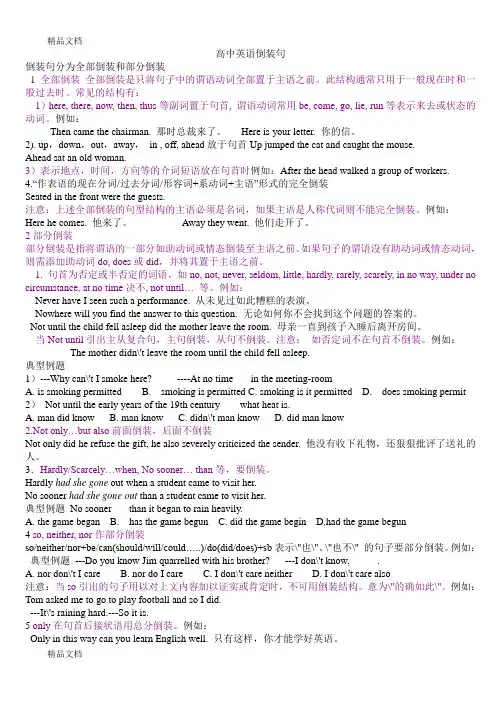
高中英语倒装句倒装句分为全部倒装和部分倒装1全部倒装全部倒装是只将句子中的谓语动词全部置于主语之前。
此结构通常只用于一般现在时和一般过去时。
常见的结构有:1)here, there, now, then, thus等副词置于句首, 谓语动词常用be, come, go, lie, run等表示来去或状态的动词。
例如:Then came the chairman. 那时总裁来了。
Here is your letter. 你的信。
2). up,down,out,away,in , off, ahead放于句首Up jumped the cat and caught the mouse.Ahead sat an old woman.3)表示地点,时间,方向等的介词短语放在句首时例如:After the head walked a group of workers.4.“作表语的现在分词/过去分词/形容词+系动词+主语”形式的完全倒装Seated in the front were the guests.注意:上述全部倒装的句型结构的主语必须是名词,如果主语是人称代词则不能完全倒装。
例如:Here he comes. 他来了。
Away they went. 他们走开了。
2部分倒装部分倒装是指将谓语的一部分如助动词或情态倒装至主语之前。
如果句子的谓语没有助动词或情态动词,则需添加助动词do, does或did,并将其置于主语之前。
1. 句首为否定或半否定的词语,如no, not, never, seldom, little, hardly, rarely, scarely, in no way, under no circumstance, at no time决不, not until… 等。
例如:Never have I seen such a performance. 从未见过如此糟糕的表演。
Nowhere will you find the answer to this question. 无论如何你不会找到这个问题的答案的。
高中英语语法倒装句讲解及练习(附答案)
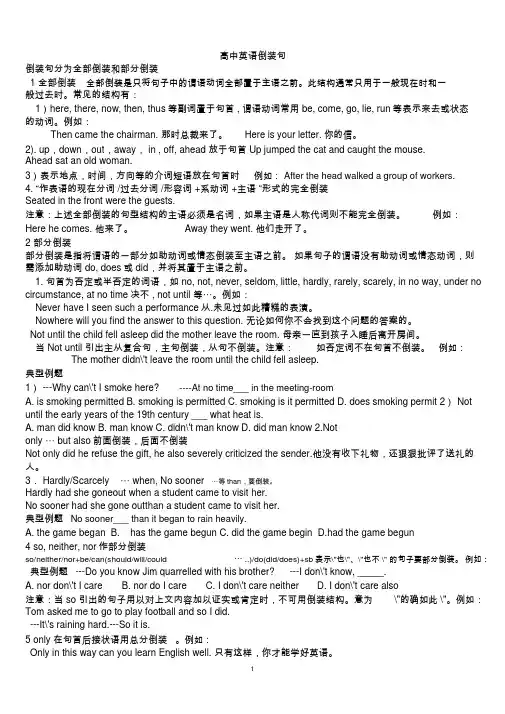
高中英语倒装句倒装句分为全部倒装和部分倒装1 全部倒装全部倒装是只将句子中的谓语动词全部置于主语之前。
此结构通常只用于一般现在时和一般过去时。
常见的结构有:1)here, there, now, then, thus等副词置于句首 , 谓语动词常用 be, come, go, lie, run等表示来去或状态的动词。
例如:Then came the chairman. 那时总裁来了。
Here is your letter. 你的信。
2). up,down,out,away, in , off, ahead 放于句首 Up jumped the cat and caught the mouse.Ahead sat an old woman.3)表示地点,时间,方向等的介词短语放在句首时例如:After the head walked a group of workers.4.“作表语的现在分词 /过去分词 /形容词 +系动词 +主语”形式的完全倒装Seated in the front were the guests.注意:上述全部倒装的句型结构的主语必须是名词,如果主语是人称代词则不能完全倒装。
例如:Here he comes. 他来了。
Away they went. 他们走开了。
2 部分倒装部分倒装是指将谓语的一部分如助动词或情态倒装至主语之前。
如果句子的谓语没有助动词或情态动词,则需添加助动词 do, does或 did,并将其置于主语之前。
1. 句首为否定或半否定的词语,如 no, not, never, seldom, little, hardly, rarely, scarely, in no way, under no circumstance, at no time决不 , not until 等⋯。
例如:Never have I seen such a performance从.未见过如此糟糕的表演。
(完整版)倒装句精讲及练习(含答案)
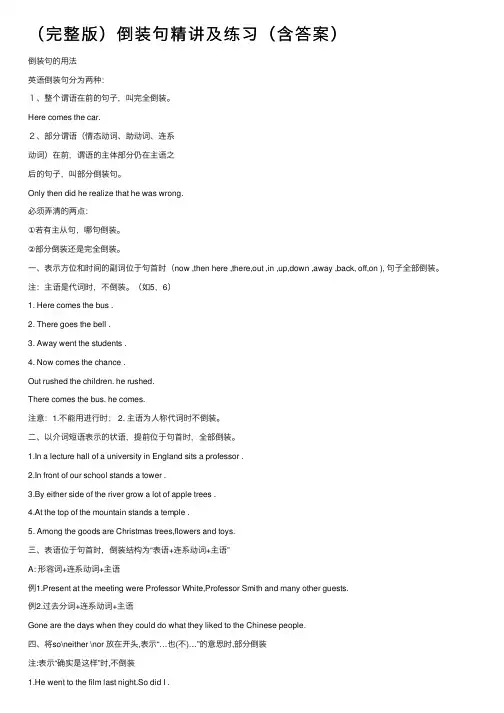
(完整版)倒装句精讲及练习(含答案)倒装句的⽤法英语倒装句分为两种:1、整个谓语在前的句⼦,叫完全倒装。
Here comes the car.2、部分谓语(情态动词、助动词、连系动词)在前,谓语的主体部分仍在主语之后的句⼦,叫部分倒装句。
Only then did he realize that he was wrong.必须弄清的两点:①若有主从句,哪句倒装。
②部分倒装还是完全倒装。
⼀、表⽰⽅位和时间的副词位于句⾸时(now ,then here ,there,out ,in ,up,down ,away ,back, off,on ), 句⼦全部倒装。
注:主语是代词时,不倒装。
(如5,6)1. Here comes the bus .2. There goes the bell .3. Away went the students .4. Now comes the chance .Out rushed the children. he rushed.There comes the bus. he comes.注意:1.不能⽤进⾏时; 2. 主语为⼈称代词时不倒装。
⼆、以介词短语表⽰的状语,提前位于句⾸时,全部倒装。
1.In a lecture hall of a university in England sits a professor .2.In front of our school stands a tower .3.By either side of the river grow a lot of apple trees .4.At the top of the mountain stands a temple .5. Among the goods are Christmas trees,flowers and toys.三、表语位于句⾸时,倒装结构为“表语+连系动词+主语”A: 形容词+连系动词+主语例1.Present at the meeting were Professor White,Professor Smith and many other guests.例2.过去分词+连系动词+主语Gone are the days when they could do what they liked to the Chinese people.四、将so\neither \nor 放在开头,表⽰“…也(不)…”的意思时,部分倒装注:表⽰“确实是这样”时,不倒装1.He went to the film last night.So did I .2.You must finish your work ,so must I .3.She is interested in the story ,so am I .4.He didn’t turn up .Neither did his brother .5.His mother told him not to go to the film .So he did.五、在if 条件句中,通常可以省略if ,⽽将从句倒装条件:在if 条件句,必须含有系动词were, 助动词had 和情态动词should1.Were he younger(=If he were younger ),he would learn skating .2.Should they forget (=If they should forget ) to bring a map with them ,they would get lost in the woods .3.Had they realized (=If they had realized ) how important the task was ,they wouldn’t have refused to accept .4.Were I you ,I would help her .六、否定词或半否定词(never .little ,seldom ,not ,nowhere ,scarely ,few ,by no means ,at no time )位于句⾸,应部分倒装1.Never have I been there .2.Little did I know about it .3.Seldom did she come late to school .4.Not a single mistake did he make .5.By no means should you buy that kind of car .七、以not until ,no sooner …than , hardly …when ,not only …but also 所引导的状语放在句⾸时,需要部分倒装1.Not until 10’clock will the library open .2.No sooner had I gone out than he came to see me .3.Hardly had the train arrived when I ran to meet my friend.4.Not only does she speak English but also she follows the British way of life .⼋、only 及其修饰的状语位于句⾸时,后⾯的句⼦部分倒装。
高考英语倒装句(语法讲义+练习+答案)语法复习
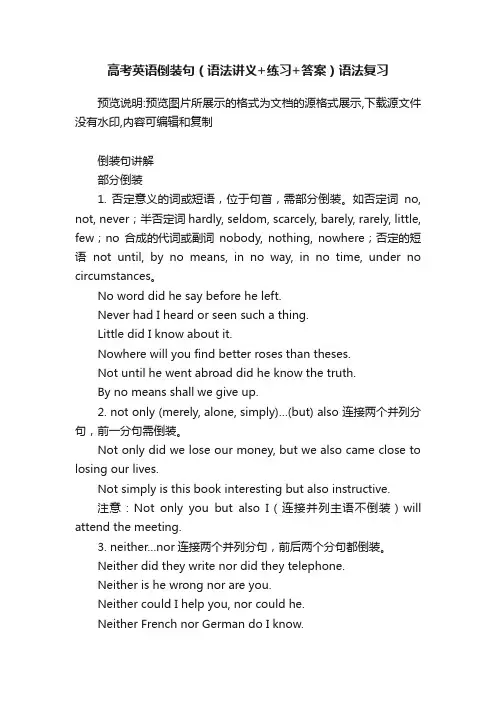
高考英语倒装句(语法讲义+练习+答案)语法复习预览说明:预览图片所展示的格式为文档的源格式展示,下载源文件没有水印,内容可编辑和复制倒装句讲解部分倒装1. 否定意义的词或短语,位于句首,需部分倒装。
如否定词no, not, never;半否定词hardly, seldom, scarcely, barely, rarely, little, few;no合成的代词或副词nobody, nothing, nowhere;否定的短语not until, by no means, in no way, in no time, under no circumstances。
No word did he say before he left.Never had I heard or seen such a thing.Little did I know about it.Nowhere will you find better roses than theses.Not until he went abroad did he know the truth.By no means shall we give up.2. not only (merely, alone, simply)…(but) also 连接两个并列分句,前一分句需倒装。
Not only did we lose our money, but we also came close to losing our lives.Not simply is this book interesting but also instructive.注意:Not only you but also I(连接并列主语不倒装)will attend the meeting.3. neither…nor连接两个并列分句,前后两个分句都倒装。
Neither did they write nor did they telephone.Neither is he wrong nor are you.Neither could I help you, nor could he.Neither French nor German do I know.Neither on Saturday nor on Sunday do we have lessons.注意: Neither you nor I(连接并列主语不倒装) like this book.4. Only + 状语,位于句首,需部分倒装。
高中英语语法倒装句讲解与练习含答案
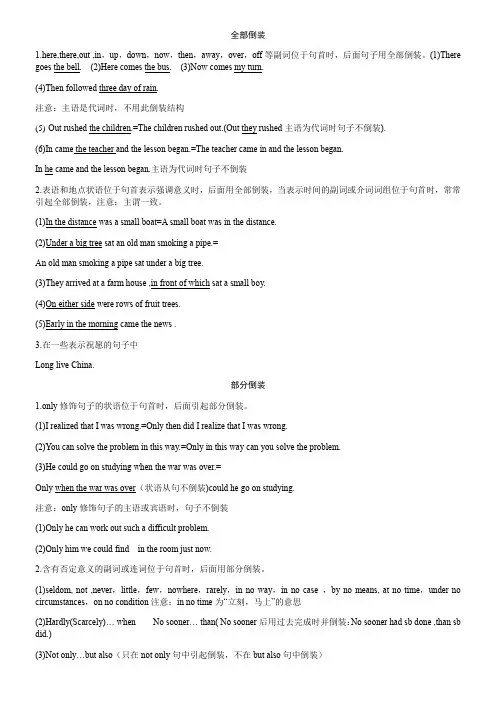
全部倒装1.here,there,out ,in,up,down,now,then,away,over,off等副词位于句首时,后面句子用全部倒装。
(1)There goes the bell. (2)Here comes the bus. (3)Now comes my turn.(4)Then followed three day of rain.注意:主语是代词时,不用此倒装结构(5)Out rushed the children.=The children rushed out.(Out they rushed主语为代词时句子不倒装).(6)In came the teacher and the lesson began.=The teacher came in and the lesson began.In he came and the lesson began.主语为代词时句子不倒装2.表语和地点状语位于句首表示强调意义时,后面用全部倒装,当表示时间的副词或介词词组位于句首时,常常引起全部倒装,注意:主谓一致。
(1)In the distance was a small boat=A small boat was in the distance.(2)Under a big tree sat an old man smoking a pipe.=An old man smoking a pipe sat under a big tree.(3)They arrived at a farm house ,in front of which sat a small boy.(4)On either side were rows of fruit trees.(5)Early in the morning came the news .3.在一些表示祝愿的句子中Long live China.部分倒装1.only修饰句子的状语位于句首时,后面引起部分倒装。
倒装句讲解与练习(高中带答案解析)
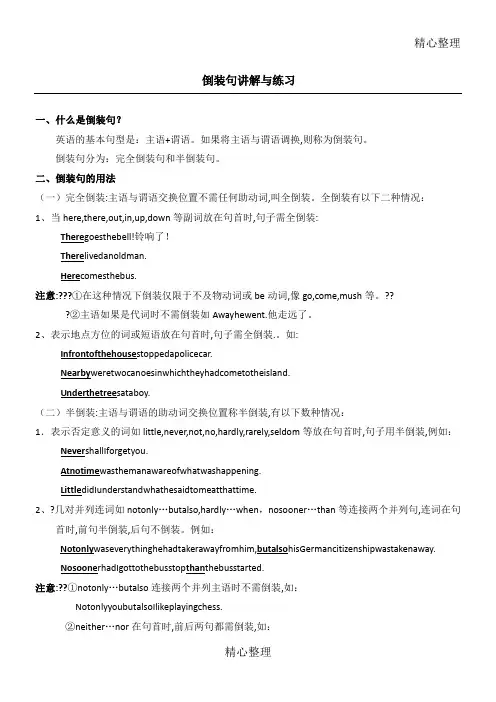
精心整理倒装句讲解与练习一、什么是倒装句?英语的基本句型是:主语+谓语。
如果将主语与谓语调换,则称为倒装句。
倒装句分为:完全倒装句和半倒装句。
二、倒装句的用法1注意212、?时,前句半倒装,后句不倒装。
例如:Notonly waseverythinghehadtakerawayfromhim,butalso hisGermancitizenshipwastakenaway.Nosoone rhadIgottothebusstop than thebusstarted.注意:??①notonly…butalso连接两个并列主语时不需倒装,如:NotonlyyoubutalsoIlikeplayingchess.②neither…nor在句首时,前后两句都需倒装,如:Neither doIhaveasister nor doesmyhusband.3、only放在句首强调状语时,主句用半倒装。
例如:Onlythen didIrealizethatIwaswrong.Onlyinthisway canIlearnfrommyfault.Onlywhenthewarwasoverin1918washeabletogetbacktowork.注意:only强调主语不倒装:如Onlytheteacherscanusetheroom.4、so…that句型,so放在句首时,主句用倒装结构,that从句不用倒装。
例如:5.倒装句练习题1.HismotherhadtalkedtohimformanyminuteswhilehewaswatchingTV,but____.A.alittledidhehear??B.littledidhehear??C.littleheardhe??D.alittleheardhe2.——Hello,ZhuHua.I’llhavetoreturntoCanadabecauseI’veworkedhereforayear. ——_____!A.Whattimeflies??B.Howtimeflies??C.Whatdoestimefly??D.Howdoestimefly3.Duringthewar,____butalsohelosthiswifeandhischild.4.6.10.——Whatsportdoyoulikebest?——Springboarddiving(跳板跳水).___todiveintowaterfromhighboard!A.Whatafunisit??B.Howfunitis??C.Howafunisit??D.Whatfunitis11.——Theoldmanwouldn’tstayathomeforarestevenifitrained.——____.Hewouldfeelsickifhestayedhomeforoneday.A.Sowouldmygrandpa???B.Sowouldn’tmygrandpaC.Neitherwouldmygrandpa??????D.Norwouldn’tmygrandpa12.___forustosurf(冲浪)ontheseainsummer!A.Whatexcitingisit??B.Howexcitingisit?C.Whatexcitingitis??D.Howexcitingitis13.Bynomeans___toourplanforthetrip.A.willsheagree??B.shewillagree??C.agreesshe??D.willagreeshe14.Thechildtiptoed(翘起脚尖走)quietlytothebird.___intotheforestwhenhewasabouttocatchit.A.Flewitaway??B.Awayflewit??C.Awayitflew??D.Flewawayit16.18.21.A.liesaverydeepvalley??B.doesaverydeepvalleylieC.averydeepvalleylies??D.averydeepvalleylays23.Theywentintoasmallhousebut___.A.nopersonsdidtheyfind????????B.notapersonfoundtheyC.notapersondidtheyfind???????D.notapersontheyfound24.——Mymotherdoesalotofhouseworkbeforegoingtowork,butshehasneverbeenlate.——_____.A.Sodoesmymother?B.Neitherdoesmymother?C.Norhasmymother?D.Soitiswithmymother25.Everyonehasarrivedateightand____.A.thendoesthemeetingbegin??B.thenbeginsthemeetingC.beginsthemeetingthen???????D.doesthemeetingbeginthen26.__itisforustoseethathedoeshisworksowell!28.30.33.MothertoldRosetobuysomesugarinthesupermarketand___.A.shedidso????B.soshedid??????C.sodidshe???????D.shedidsuch34.___shortlyafteritstoppedraining.A.Thereappearedacolorfulrainbowinthesky?B.IntheskydidacolorfulrainbowappearC.Thereacolorfulrainbowappearedinthesky?D.Thereintheskyacolorfulrainbowappeared35.Afterthepatientswentintotheoffice,__working.A.onlyadoctordidtheysee???B.onlyadoctorsawtheyC.onlyadoctortheysaw???????D.onlyadoctorhadtheyseen36.Wehavelookedforthelostsheepalmosteverywhere,butnowhere_____.A.wecanfindit???B.canwefindit???C.canfindweit???D.wecanitfind37.Onlysincetheygaveupthatgoodchance___toshowtheirinventionagain.39.40.A.sodoI????B.sowillI???C.nordoI???D.norwillI44.Sinceeveryonehascomebackhere,___.A.ongoesourdiscussion?????B.goesonourdiscussionC.ondoesourdiscussiongo??D.doesonourdiscussiongo45.__whenwepassedbyitsnest.A.Upintotheblueskydidthebirdfly?????B.UpintotheblueskythebirdflewC.Upintotheblueskyflewthebird????????D.Flewupintotheblueskythebird参考答案及讲解1.B。
高中英语倒装句讲解以及习题(附答案)
桌子上面有一个盒子。
✧㈡、“时”:表示时间副词,如:now,then,
Eg:Now comes your turn.
现在轮到你了。
✧㈢、“表”:表语放句子前,“表语+系动词+主语” 的结构
Eg:Present at the party were Mr. Green and many other guests.
格林先生和其他的客人在这个聚会上。
Seated on the ground are a group of young men.
一群年轻人坐在了地上。
✧㈣、“地”:地点状语放在句首
Eg:In south of the river lies a small factory.
小工厂位于河的南方。
From the valley came a cry.
山谷传来一阵哭声。
✧㈤、“方”:表方位的副词here, there 或out, in, up, down, away, off 等标志词放在句首 Eg:There lies a large wheat field in front of the house.
房子前面有一大片麦田。
Off all the lights went when I came in.
当我进来时,所有的灯都灭了。
四、半倒装:“八部”=不只让步也常需(虚)如此祝福✧㈠、“不”表示否定。
高中倒装练习题及讲解及答案
高中倒装练习题及讲解及答案### 高中英语倒装句练习题及答案练习题1:Only after finishing his homework did he go to the park.答案:1. 这句话使用了倒装结构,强调了“完成作业”这个动作发生在“去公园”之前。
2. 原句:He went to the park only after finishing his homework.练习题2:Not until he reached home did he realize he had forgotten his keys.答案:1. 这句话中的倒装结构用来强调“直到他到家”这个时间点。
2. 原句:He did not realize he had forgotten his keys until he reached home.练习题3:Such was the power of the storm that the trees were uprooted.答案:1. 这里使用了倒装结构来强调风暴的力量。
2. 原句:The power of the storm was such that the trees were uprooted.练习题4:Never have I seen such a beautiful sunset.答案:1. 这句话中的倒装结构用来强调“从未见过”。
2. 原句:I have never seen such a beautiful sunset.练习题5:Only by working hard can you achieve success.答案:1. 这句话中的倒装结构用来强调“只有通过努力工作”这个条件。
2. 原句:You can achieve success only by working hard.练习题6:So fast did the car move that we could hardly see it.答案:1. 这句话中的倒装结构用来强调车辆移动的速度。
英语倒装句精讲及习题(附答案)
英语倒装句精讲及习题(附答案)英语句子的自然语序是主语在前,谓语动词在后。
把谓语动词放在主语之前,就叫倒装结构。
如果全部谓语放在主语之前,叫全部倒装;只把助动词或情态动词放在主语之前就叫部分倒装。
一、完全倒装1.时间状语now,then等,地点状语here,there, out,in,up,down,away等副词位于句首①Here comes the bus. ②There goes the bell. ③Now comes your turn. ④Out went the children. 当代词作主语时,主谓语序不变。
例如:⑤Here it is. 在这儿。
⑥Here he comes. 他来了。
2.当句首状语为表示时间或地点的介词词组时,也常常引起全部倒装①在城市南部坐落着一家钢铁工厂。
South of the city lies a big steel factory.②从山谷里传来了一阵可怕的声音。
From the valley came a frightening sound.3.表语置于句首时,倒装结构为“表语+连系动词+主语”1)形容词+连系动词+主语出席会议的有怀特教授,史密斯教授,格林教授及其他嘉宾。
Present at the meeting were Professor White, Professor Smith, Professor Greenand many other guests2)过去分词+连系动词+主语他们可以随心所欲的日子过去了。
Gone are the days when they would do what they liked.二、部分倒装1.用于疑问句Do you speak English?2.If引导的条件状语从句谓语动词为were, had或should时,可省去if,把那三个词挪至句首。
Had you reviewed your lessons,you might have passed the examination.Were there enough hands, we should go on with the project.Should I be free tomorrow, I will come to the party.3.用于“形容词(或名词、动词)+as(though)引导的让步状语从句中”①Pretty as she is, she is not clever. ②Try as he could, he might fall again.如果从句的表语是名词,其名词前不加任何冠词。
高考语法复习:倒装句讲解及提升练习(有答案)
高考语法复习:倒装句讲解及提升练习考点一倒装句1.完全倒装表示地点、时间或方位的副词或介词短语here,there,now,then,up,down,away,off,in,out,in the room,on the wall等置于句首,且主语为名词时。
At the meeting place of the Yangtze River and the Jialing River lies Chongqing,one of the ten largest cities in China.在长江和嘉陵江的交汇处,坐落着中国十大城市之一的重庆。
2.部分倒装(1)否定副词(never,neither,nor,hardly,little,seldom,rarely等)或表示否定意义的介词短语(at no time,by no means,on no condition,in no case等)置于句首时。
(2)only修饰介词短语、副词或状语从句,且置于句首时。
(3)so/neither+助动词/be动词/情态动词+主语意为“……也是如此/也不……”。
(4)在not only...but (also)...句型中,若not only置于句首时,需将not only所在的句子部分倒装。
(5)not until...置于句首时,主句需部分倒装。
(6)so...that...和such...that...句式中,so或such及其所修饰的成分置于句首时,主句需部分倒装。
Not until recently did they encourage the development of touristrelated activities in the rural areas.直到近期,他们才鼓励在农村地区开展与旅游业有关的活动。
Only after they had discussed the matter for several hours did they reach a decision.他们讨论了那个问题几个小时之后才做出决定。
- 1、下载文档前请自行甄别文档内容的完整性,平台不提供额外的编辑、内容补充、找答案等附加服务。
- 2、"仅部分预览"的文档,不可在线预览部分如存在完整性等问题,可反馈申请退款(可完整预览的文档不适用该条件!)。
- 3、如文档侵犯您的权益,请联系客服反馈,我们会尽快为您处理(人工客服工作时间:9:00-18:30)。
高中英语倒装句倒装句分为全部倒装和部分倒装1全部倒装全部倒装是只将句子中的谓语动词全部置于主语之前。
此结构通常只用于一般现在时和一般过去时。
常见的结构有:1)here, there, now, then, thus等副词置于句首, 谓语动词常用be, come, go, lie, run等表示来去或状态的动词。
例如:Then came the chairman. 那时总裁来了。
Here is your letter. 你的信。
2). up,down,out,away,in , off, ahead放于句首Up jumped the cat and caught the mouse.Ahead sat an old woman.3)表示地点,时间,方向等的介词短语放在句首时例如:After the head walked a group of workers.4.“作表语的现在分词/过去分词/形容词+系动词+主语”形式的完全倒装Seated in the front were the guests.注意:上述全部倒装的句型结构的主语必须是名词,如果主语是人称代词则不能完全倒装。
例如:Here he comes. 他来了。
Away they went. 他们走开了。
2部分倒装部分倒装是指将谓语的一部分如助动词或情态倒装至主语之前。
如果句子的谓语没有助动词或情态动词,则需添加助动词do, does或did,并将其置于主语之前。
1. 句首为否定或半否定的词语,如no, not, never, seldom, little, hardly, rarely, scarely, in no way, under no circumstance, at no time决不, not until…等。
例如:Never have I seen such a performance. 从未见过如此糟糕的表演。
Nowhere will you find the answer to this question. 无论如何你不会找到这个问题的答案的。
Not until the child fell asleep did the mother leave the room. 母亲一直到孩子入睡后离开房间。
当Not until引出主从复合句,主句倒装,从句不倒装。
注意:如否定词不在句首不倒装。
例如:The mother didn\'t leave the room until the child fell asleep.典型例题1)---Why can\'t I smoke here? ----At no time___ in the meeting-roomA. is smoking permittedB.smoking is permittedC. smoking is it permittedD.does smoking permit2)Not until the early years of the 19th century ___ what heat is.A. man did knowB. man knowC. didn\'t man knowD. did man know2.Not only…but also前面倒装,后面不倒装Not only did he refuse the gift, he also severely criticized the sender. 他没有收下礼物,还狠狠批评了送礼的人。
3.Hardly/Scarcely…when, No sooner…than等,要倒装。
Hardly had she gone out when a student came to visit her.No sooner had she gone out than a student came to visit her.典型例题No sooner___ than it began to rain heavily.A. the game beganB.has the game begunC. did the game beginD.had the game begun4 so, neither, nor作部分倒装so/neither/nor+be/can(should/will/could…..)/do(did/does)+sb表示\"也\"、\"也不\" 的句子要部分倒装。
例如:典型例题---Do you know Jim quarrelled with his brother? ---I don\'t know, _____.A. nor don\'t I careB. nor do I careC. I don\'t care neitherD. I don\'t care also注意:当so引出的句子用以对上文内容加以证实或肯定时,不可用倒装结构。
意为\"的确如此\"。
例如:Tom asked me to go to play football and so I did.---It\'s raining hard.---So it is.5 only在句首后接状语用总分倒装。
例如:Only in this way can you learn English well. 只有这样,你才能学好英语。
如果句子为主从复合句,则主句倒装,从句不倒装。
例如:Only when he is seriously ill does he ever stay in bed. 病得狠重时,他才卧床休息。
注意:如果only后的词组不是状语,不需倒装。
e.g. Only Wang Lili knows this. onlyOnly a few young men went to the theatre. (修饰主语时则不用倒装)Ex:1)Only in this way ___ make progress in your English. A. you B. can you C. you be able to D. will you able to2) Only when the meeting was over___ go back to meet his friend. A. he could B. he was able to C. was he able toD. was able to he3)Only after liberation___ to be treated as human beings.A.did they beginB. they had begunC.they did beginD. had they begun6 as, though 引导的倒装句as / though引导的让步从句必须将表语或状语提前(形容词, 副词, 分词, 实义动词提前)。
但需注意:1)句首名词不能带任何冠词。
Child as he is,he seems to know everything.(child前不加冠词注意:让步状语从句中,有though,although时,后面的主句不能有but,但是though 和yet可连用。
7. so…that 句型中的so 位于句首时,需倒装。
例如:So frightened was he that he did not dare to move an inch. 他害怕得很,动也不敢动。
Light travels so fast that it is difficult for us to imagine its speed.= So fast does light travel that it is difficult for us to imagine its speed.8. So + 形容词、副词及such 置于句首时要倒装。
So happy did he feel. Such was me.9. 在某些表示祝愿的句型中。
例如:May you all be happy. 愿你们都快乐。
10. 在虚拟语气条件句中从句谓语动词有were, had, should等词,可将if 省略,把were, had, should 移到主语之前,采取部分倒装。
例如:Were I you, I would try it again. 我是你的话,就再试一次。
11. "分词(代词) + be + 主语"结构。
如:Walking at the head of the line was our teacher.Such was the story he told me.done做形容词在句中做表语时,常把表语放在句首,要用倒装句式。
Gone forever are the days when the Chinese people had to use foreign oil.12.为了保持句子的平蘅或为了强调表语和状语,或使上下文紧密衔接,把它们放在句首用倒装句。
该结构不需加助动词。
East of the town lies a beautiful lake.In a lecture hall of a university in England sits a professor.Outside the doct or’s clinic were twenty patients.倒装句练习:1._______ and caught the mouse.A. Up the cat jumpedB. The cat up jumpedC. Up jumped the catD. Jumped up the cat2.______ and the lesson began. A. In came Mr Brown B. Mr Brown in came C. In came he D. came in Mr Brown3. Over _______ , dead. A. rolling the goat B. rolled the goat C. did the goat roll D. the goat rolled4.— Where is my shirt, mum? —_________. A. There is it B. There it is C. There is D. Here is it5. — Where is your father? —Oh, ________.A. here he comesB. he here comesC. here does he comeD. here comes he6.The door opened and there ________ .A. enters an old manB. entered an old manC. did an old man enterD. an old man entered7. Now ______ your turn to recite the text. A. will come B. comes C. has come D. there is8. Often _____ them not to smoke here. A. we advised B. advised me C. did we advise D. had we advised9. ________ playing soldiers.A. Inside the room were two boys B. Inside the room two boysC. Were two boys inside the roomD. Inside the room was two boys10. On the wall _______ two large portraits.A. are hanging B .Hanged C. hang D. hangs11. _______ who was wounded in the stomach.A. Among them were a soldierB. Among them was a soldierC. Among them a soldier wasD. Among they was a soldier12. Next door to ours ________ , who is no less than eighty.A. that lives an old manB. does an old man liveC. lives an old manD. where lives an old man13.She plays the piano very well, ______.A. so every one of us doesB. every one of us doesC. so does every one of usD. so do every one of us14.You say he works hard, ______, and _____.A. so he does; so you doB. so he does; so do youC. so does he; so do youD. so does he; so you do15. —I thought you women were present at the meeting. —__________.A. So we wereB. So we didC. So were weD. So did we16.I don’t think Jack will come today, _____. A. nor will Mary B. and Mary doesn’t C. Mary will either D. or Mary does17. She is fond of cooking, _____I . A. so am B. nor am C. neither do D. nor do18.Marx was born in Germany and German was his native language.A. So it was with EnglesB. So was it with EnglesC. So was EnglesD. So did Engles19.A fish needs water and without water it will die._______.A. So does a manB. So will a manC. So it is with a manD. So is it with a man20. So absorbed _______ the work that she often forgot to _____ her meals.A. had she been in; doB. she was in; makeC. was she in; takeD. she had been in ; have21.So loudly ______ that every one of the class could hear him.A. did he speakB. did he spokeC. spoke heD. he spoke22. __________ his apperance that no one could recognize him.A. Strange so wasB. So strange wasC. Was so strangeD. So was strange23.Not once ______ their plan.A. did they change B. they changed C. changed they D. they did change24. Never ______ such a wonderful place as Hangzhou. A. are seeing B. had I seen C. I have seen D. have I seen25.Seldom ______ TV during the day. A. they watch B. are they watching C. have they watched D. do they watch26.Nowhere ______ as in my garden.A. the flowers were so beautifulB. were the flowers so beautifulC. so beautiful were the flowersD. so beautiful the flowers were27. Hardly ________ his homework when he went out.A. finished heB. he had finishedC. did he finishD. had he finished28.Scarcely _____ finished their homework ______ I came into the classroom.A. had they; thanB. they had; whenC. had they; whenD. did they; when29. Not only _______ a promise, but also he kept it.A. has he madeB. does he makeC. he madeD. did he make30. Not until his comrades criticized him _______ to admit his mistake.A. had he begunB. began heC. did he beginD. does he begin。
